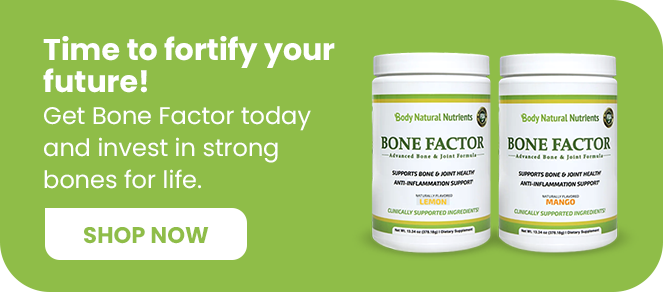Worried about your bones as you munch on that kale salad? You’re not alone. Many people ponder whether ditching dairy and meat for a vegan diet could spell trouble for their bone health.
Interestingly, research shows that folks on a a vegan diet for osteoporosis might have to keep an extra eye on their bones. But it’s not all doom and gloom.
Did you know? Studies suggest vegans could face a higher risk of broken bones if they’re not careful with their nutrition. Fear not, though! This article is here to guide you through the ins and outs of keeping your skeleton sturdy while enjoying all the greens (and oranges, purples, reds..) nature has to offer.
We’ll arm you with facts, tips, and tasty bone-friendly vegan eats that’ll make both your taste buds and tibias thankful.
Get ready to boost those bones!
Key Takeaways
- Eating a vegan diet can increase the chance of broken bones if you’re not getting enough calcium, vitamin D, vitamin K, and protein. Choose foods like fortified plant milks and tofu to stay strong.
- Two key studies found that vegans might have lower bone density which can lead to fractures. It’s important for vegans to eat lots of nutrients to keep their bones healthy.
- For older adults, a well-planned vegan diet could mean less risk of osteoporosis. This means eating plenty of calcium-rich foods and making sure you get enough vitamin D, vitamin K, and protein.
- Adding bone-friendly vegan foods into your diet is easy. Try dark leafy greens like kale, calcium-fortified non-dairy milk, tofu, and almonds for meals full of calcium and other good stuff for your bones.
- To avoid weak bones on a vegan diet make sure to eat different nutritious foods every day. If needed use supplements to meet your body’s needs for bone health.
Studies on the Relationship between a Plant-Based Diet and Bone Health
Two recent studies, the U.S. National Health and Nutrition Examination Survey (NHANES) Data from 2005-2018 and the Cross-Sectional RBVD Study, provide valuable insights into how a plant-based diet affects bone health.
These studies shed light on the impact of a vegan diet on osteoporosis risk and offer important findings for those considering or already following a plant-based lifestyle.
Study 1: U.S. National Health and Nutrition Examination Survey (NHANES) Data from 2005-2018
Researchers looked at health surveys from 2005 to 2018. They found vegans might have lower bone density. This could lead to more breaks and fractures. The study used a big group of people’s diet and health info to understand bone problems.
The NHANES data showed that not eating enough calcium, vitamin D, vitamin K, and protein is linked with weaker bones for vegans. People who avoid animal products need to pick plant-based foods rich in these nutrients carefully.
Foods like fortified plant milks, tofu, and leafy greens are good options for keeping bones strong without dairy or meat.
Study 2: Cross-Sectional RBVD Study
The Cross-Sectional RBVD Study found evidence linking a vegan diet to potential bone health risks. Vegans might have a higher risk of reduced bone density and osteoporosis. This study suggests that attention to nutrient intake, particularly calcium, vitamin D, vitamin K, and protein, is crucial for vegans aiming to support their bone health.
It’s essential for individuals with bone problems considering a vegan diet to ensure they are meeting their nutritional requirements for optimal bone health.
Benefits and Risks of a Vegan Diet for Older Adults
A vegan diet may lower the risk of osteoporosis in older adults. However, it can also lead to potential nutrient deficiencies.
Lower risk of osteoporosis
Vegan diets among older adults link to a reduced risk of osteoporosis. Research suggests that following a well-planned vegan diet can be beneficial for bone health, minimizing the chances of developing osteoporosis.
To maintain strong bones, it’s essential for those following a plant-based diet to focus on consuming calcium-rich foods such as fortified plant milks, tofu, and leafy green vegetables.
Additionally, ensuring adequate intake of vitamin D, vitamin K, and protein is crucial for maintaining optimal bone health while adhering to a vegan lifestyle.
Potential nutrient deficiencies
While a plant-based diet can lower the risk of osteoporosis, it’s important for vegans to be aware of potential nutrient deficiencies. Vegans need to ensure they are getting enough calcium, vitamin D, vitamin K, and protein for bone health.
A balanced vegan diet with attention to nutrient intake can support bone health by including fortified plant milks, tofu, and leafy green vegetables. Paying close attention to these nutrients is essential in preventing any deficiencies that could impact bone health.
Tips for Incorporating Bone-Friendly Foods into a Vegan Diet
Incorporate calcium-rich plant-based foods like tofu, kale, and almonds into daily meals. Experiment with calcium-fortified non-dairy milk and yogurt for added bone support.
Calcium and vitamin D sources
Vegans can get calcium from fortified plant milks, tofu, and leafy green vegetables. Vitamin D sources include fortified foods like soy milk and cereals, as well as sunlight exposure for natural production in the body.
It is important for vegans to pay attention to their intake of these nutrients to support bone health. Additionally, incorporating a variety of calcium-fortified foods into meals and snacks can help meet daily requirements.
Vegans need to focus on consuming enough calcium and vitamin D through their diet or supplements to support bone health while following a vegan lifestyle.
Plant-based, bone-friendly foods
Incorporate dark leafy greens like kale and spinach into your daily meals to boost your calcium intake. Enjoy fortified plant milks, such as almond or soy milk, as a dairy alternative rich in bone-strengthening nutrients.
Try adding tofu, edamame, and tempeh to your diet for an excellent source of plant-based protein crucial for bone health. Include chia seeds, almonds, and figs in your snacks for added calcium and other essential minerals that support strong bones.
Remember to mix up your choices by adding various nutrient-rich foods – from fortified cereals to broccoli – into your meals daily. Prioritize consuming vitamin K sources like Brussels sprouts and cabbage along with regular exposure to sunlight for ample vitamin D intake.
Recipes and meal ideas
To build strong bones while following a vegan diet, incorporate calcium-rich foods such as fortified plant milks, tofu, and leafy green vegetables. Start your day with a smoothie made from calcium-fortified almond milk, kale or spinach, and a ripe banana.
For lunch or dinner, try adding tofu to stir-fries or salads for a protein-packed meal that’s also high in calcium. Prepare a nourishing dinner by cooking up some sautéed leafy greens like collard greens or broccoli rabe with garlic and olive oil to maximize your intake of bone-boosting nutrients.
Remember to use these simple recipe ideas incorporating essential bone-building ingredients like leafy greens and fortified plant-based sources of calcium in your daily meals.
FAQs
- Is a vegan diet for osteoporosis management possible?
Yes, following a plant-based diet can lower the risk of osteoporosis. Eating dark leafy greens and calcium-fortified foods helps in building strong bones. - Are there vegan sources of calcium?
Absolutely! Vegans can get their calcium from plant-based sources like dark leafy greens, and foods fortified with calcium are great options too. - Does being vegan affect bone health?
A well-planned vegan diet that includes plenty of bone-healing foods can support bone health and may even reverse osteoporosis by providing essential nutrients for strong bones. - How does a plant-based diet impact rates of osteoporosis among vegans?
Studies suggest that people on a plant-based or dairy-free diet, when incorporating sufficient amounts of key nutrients like calcium and vitamin D, might have a lower risk of developing osteoporosis compared to non-vegans. - What should vegans eat to ensure good bone health?
Vegans should focus on consuming plenty of dark leafy greens, Vegan nutrition including various vegetables, fruits, nuts, seeds, and calcium-fortified products to maintain healthy bones and prevent nutritional deficiencies.
Conclusion and Recommendations about Vegan Diet for Osteoporosis Management
Incorporate calcium-rich foods like fortified plant milks, tofu, and leafy greens. Ensure adequate intake of vitamin D, vitamin K, and protein for bone health. Stay mindful of potential nutrient deficiencies on a vegan diet.
Maintaining bone health is achievable with a well-planned approach to vegan nutrition. More research will continue to shed light on the impact of vegan diets on osteoporosis.



